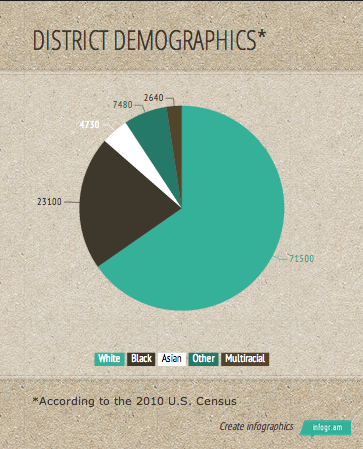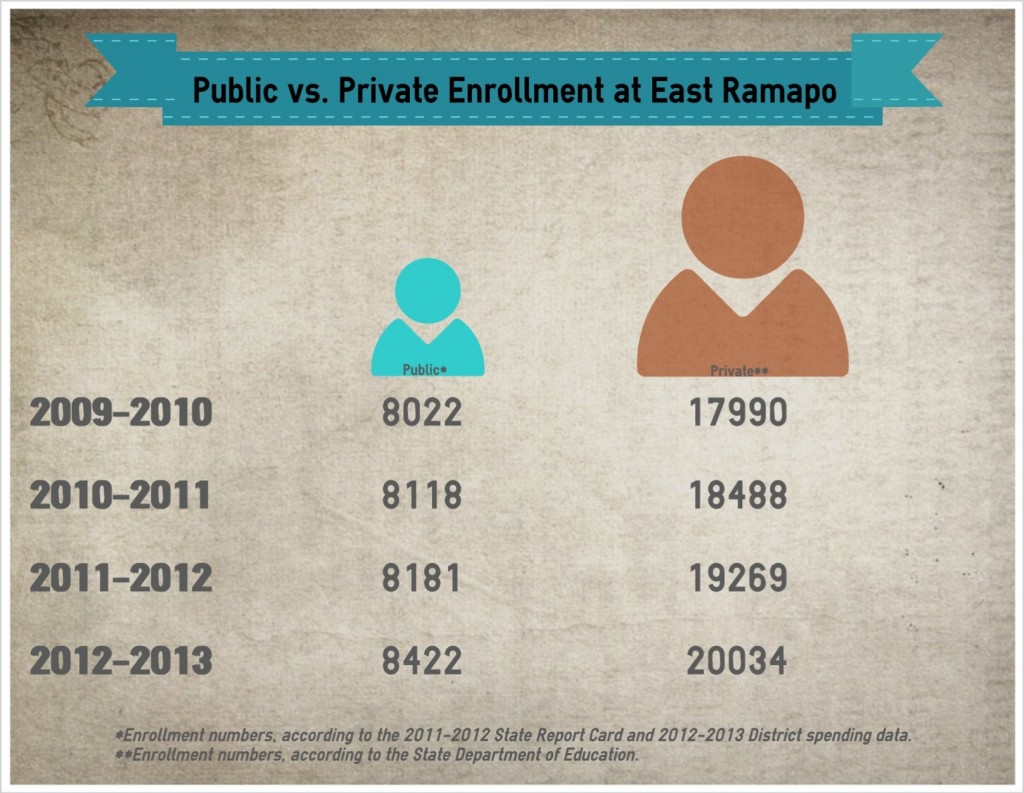Many alumni often look back fondly on their experiences at East Ramapo Central School District.
“[It] was a great district,” said Stacy Gutner, a 1977 graduate of Ramapo High School. “Yes, we had problems, but nothing like they do now.”
East Ramapo, one of eight public school districts in the suburbs of Rockland County, is no longer the “greatest” school district many remember it to be. It has become a shadow of its former self, with so many of its programs being cut, resorting to just covering the basics.
Deep-seated tension, anger and resentment have divided this community: on one side, the African American and Hispanic students and families, who use the public schools, and, on the other, the Hasidic and ultra-Orthodox majority who run the Board of Education, but send their children to private religious institutions.
In addition, there are close to 20,000 private school students and about 9,000 public school students.
The district, like many others in New York, relies on a mixture of taxpayer, federal and state funds to operate, and has been struggling financially. A decrease in aid and a 2-percent tax cap, implemented by Gov. Andrew Cuomo in 2011, has left state and local governments crippled.
According to state and federal laws, if a child requires special education and the district cannot provide it, then public money must pay for the child to attend a different school that can provide those services, whether it be out-of-district or private schools. However, funding is still limited only to transportation, special education and textbooks.
In this community, those of the Orthodox and Hasidic faith are rigidly observant of Jewish practices and feel that the East Ramapo Central School District cannot provide education that is consistent with their beliefs. The Hasidic community has argued that their religion forbids them from sending their children to public schools, as boys cannot attend the same school as girls; in fact, they are not even allowed to ride the same bus.
Tension is visibly present at many school board meetings, where public school parents say that there is a sheer disrespect from the Hasidic and Orthodox communities.
“There’s a lack of respect there [in the district]. There is a lack of respect for other cultures, other religions,” said Peter M., who spoke on the condition that his last name not be released for fear of speaking out against this sensitive topic.
“There’s a basic lack of respect,” he repeated, with a hint of resignation in his face.
This lack of respect is most apparent at school board meetings. In July, the school board found itself in hot water, when its lawyer, Chris Kirby, was filmed verbally berating a parent and calling her a number of expletives in a parking lot after a heated argument at a board meeting. Parents protested and challenged the board to find another law firm. The board promised they would, but they have yet to do so.
The high number of religious factions within the community has resulted in some undeserved tensions. For some in the Orthodox community, what one faction chooses to do is not necessarily what they believe.
“I believe that there are groups that take advantage and those that are taken advantage of. There are factions within the community that try their hardest to accommodate their surrounding neighbors and those that build high walls to keep others out,” said Debbie Samuels, a private school parent, in an email. “Sadly enough, Ramapo is a deeply divided community by all factions.”
[MORE: “Race and Religion”]
[MORE: “ERCSD students fight back”]
Struggling to find a solution
Assemblyman Zebrowski is well aware of the tensions that exist in East Ramapo Central School District. Parents often come to him, feeling frustrated by the fact that they feel their needs are not being met in the school district, he says.
“Those that don’t use the public system at all have gained control through legitimate means, like the election process, and are running the school district and public school parents feel as though their voices are not heard,” said Zebrowski.
As a result, he has proposed that a study be commissioned on the feasibility of splitting East Ramapo into two separate school districts – one public and the other private. If any students who remained in the private school district wanted to go to the public school, that district will pay for the student to attend public school.
“If you separate the districts in a way of one primarily serves private school families and one primarily serves public school families, then the private school community will have to decide what they want to pay for,” Zebrowski explained.
Public school parents largely disagree, fearing that this type of solution may not work. Many cite the nearby school district of Kiryas Joel in Monroe, NY as a prime example.
“All one has to do is look at the history of the Kiryas Joel school district to envision the problems that creating a Ramapo private school district would entail,” posted a parent, who wished to be kept anonymous, on Facebook.
The problem to which he refers to is the development of a private, religious school district that was ultimately declared unconstitutional by the Supreme Court, because it violated the establishment clause, meaning it favored one religion over another. Later, changes in the wording of the law allowed the religious school district to be created.
Zebrowski does not think that a Kiryas Joel-type situation would happen in East Ramapo, should his plan go forward.
“[In Kiryas Joel], you had private school parents that wanted their own school district. There has been a development of a school district for private school parents, which is even a more questionable action by the state,” he said. “If the Kiryas Joel school district was ruled constitutional, I have no fear that this would be ruled unconstitutional.”
Public parents fight for control
Parents in the school district feel it is pointless to separate the school district. First, they argue that the state needs to take power away from the school board. Second, they argue, the state aid formula needs to be changed. Some go as far to argue that the district should be dissolved completely.
Peter M., as both a parent and graduate of East Ramapo, is well aware of that have occurred. He had to put his oldest child into a private school, because he didn’t like what was going on.
“I did not like that they [the school board] kept cutting classes and that they focused on money – and only money. They say that taxes are too high – and I understand that – [but] they would rather take the money out of my pay and they don’t pay much value on education,” he said.
 Nearly 400 parents and residents in the East Ramapo School District brought up a class action suit against the school board. According to court documents, the plaintiffs claimed that district officials have used public funds to support private religious institutions and have separated special education students by race.
Nearly 400 parents and residents in the East Ramapo School District brought up a class action suit against the school board. According to court documents, the plaintiffs claimed that district officials have used public funds to support private religious institutions and have separated special education students by race.
District officials have also allowed federal and state funds to be used for religious books and programs, according to court papers. A Freedom of information Law request showed that the school board did purchase numerous religious textbooks. However, records did not specify whether they were purchased with public funds.
In September, a judge allowed the key claims against district officials to be brought to trial, but dismissed others.
[SLIDESHOW: “Lawsuits Upon Lawsuits”]
Some private school parents don’t feel that race is involved and argue that everyone has a right to education. Most feel that private schools are only getting limited benefits from school taxes.
Debbie Samuels, who has two children in private school, pays $34,000 in yearly tuition, in addition to $15,000 in taxes.
“The only direct benefit I get from my school tax payment is bussing for my children…Bussing is only provided on days that the public schools are open and only until a certain time at night,” she explained. “The private schools also need to make their own private arrangements for any extracurricular activities (i.e. off campus day trips) during school hours.”
When asked about Assemblyman Zebrowski’s proposed study, Samuels and other private school parents had not heard about it, but seemed enthusiastic about his plan.
“I am a big supporter of school vouchers,” she added.
Zebrowski realizes the challenges he and other Rockland County officials face in trying to resolve the issues, but he feels that coming up with a solution that satisfies the needs of both private and public students is important.
“My inspiration is…seeing that these kids get the same education that other kids in Rockland County have. And giving parents the same say in their school district that every other parent in Rockland County has,” Zebrowski said. “And I think at some point – we may not be able to come up with a perfect situation, but we could come up with a situation that works for the students.”

Leave a Reply